Holdship Surname Ancestry ResultsOur indexes 1000-1999 include entries for the spelling 'holdship'. In the period you have requested, we have the following 28 records (displaying 21 to 28): Single Surname Subscription | | | Buying all 28 results of this search individually would cost £150.00. But you can have free access to all 28 records for a year, to view, to save and print, for £100. Save £50.00. More... |
These sample scans are from the original record. You will get scans of the full pages or articles where the surname you searched for has been found. Your web browser may prevent the sample windows from opening; in this case please change your browser settings to allow pop-up windows from this site. Long-stay Paupers in Workhouses: Staines
(1861)
This comprehensive return by the Poor Law Board for England and Wales in July 1861 revealed that of the 67,800 paupers aged 16 or over, exclusive of vagrants, then in the Board's workhouses, 14,216 (6,569 men, 7,647 women) had been inmates for a continuous period of five years and upwards. The return lists all these long-stay inmates from each of the 626 workhouses that had been existence for five years and more, giving full name; the amount of time that each had been in the workhouse (years and months); the reason assigned why the pauper in each case was unable to sustain himself or herself; and whether or not the pauper had been brought up in a district or workhouse school (very few had). The commonest reasons given for this long stay in the workhouse were: old age and infirm (3,331); infirm (2,565); idiot (1,565); weak mind (1,026); imbecile (997); and illness (493). HOLDSHIP. Cost: £6.00.  | Sample scan, click to enlarge

| London and Westminster Bank Shareholders
(1873)
Copy of the return by the London and Westminster Bank to the Inland Revenue listing the 'persons of whom the Company or partnership consists', pursuant to 7 & 8 Vic. cap. 32: giving full name (surname first), residence and occupation (often not stated).HOLDSHIP. Cost: £4.00.  | Sample scan, click to enlarge

| Inhabitants of New Windsor in Berkshire
(1877)
Gentry, farmers and traders listed in J. G. Harrod's Royal County Directory of Berkshire. (The sample scan is from the section for Wallingford)HOLDSHIP. Cost: £6.00.  | Sample scan, click to enlarge
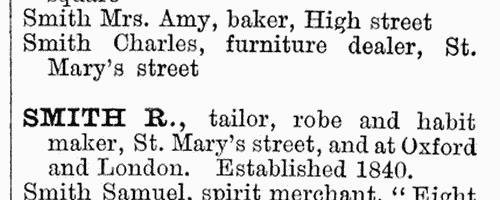
| Boys entering Cheltenham College
(1883)
Cheltenham College 'was founded in order to provide for the sons of gentlemen a Classical, Mathematical, and General Education of the highest order, on moderate terms, in strict conformity with the principles and doctrines of the Church of England.'
Andrew Alexander Hunter, the college registrar, compiled the first edition of the College Register in four parts from 1883 to 1886: these merely listed the boys by term of entry, with their dates of birth and names and addresses of their fathers. Circulars were also sent out to all Old Cheltonians whose addresses were known, requesting additional details. On the basis of the returns from these and Hunter's further researches, this much fuller register was published in 1890.
The information after each boy's name is given (where known and applicable) in this format: father's full name and address as of the time the boy entered the college; class and department on entering the college (classes being number from 1 downwards, and these again divided into A and B, some into C and D, others into P (Principal's side) and V. P. (Vice-Principal's side) - 1A was the highest class in each department: besides this, certain others were called Addiscombe, Woolwich, Civil, Direct, Line, Sandhurst, Naval, Special, Preparatory, Latin, and India Civil) and the same on leaving, name of Boarding House (or 'Day Boy'), scholastic and athletic honours attained at the college, and subsequent career (including date and place of death, or present address in 1890, if known).
Of course, in the case of these boys entering the school in the last few years before 1890 their career lay in the future, and the information gives relates only to their parentage and their time at school.HOLDSHIP. Cost: £4.00.  | Sample scan, click to enlarge
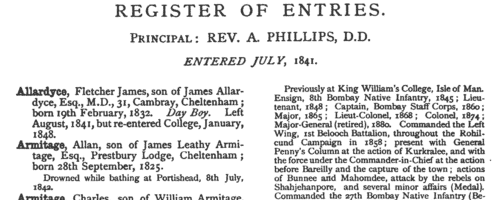
| Men-at-the-Bar
(1885)
Joseph Foster's Hand-List of Men-at-the-Bar gives a paragraph biography of men who had been called to the bar and were alive in 1885. After the full name (surname first, in capitals) there is a short statement of occupation or practice; a student at which inn of court; when called to the bar; father's name and then address; when born; if married, and, if so, wife's name (and her father's name) is often given. At the foot, in small type, is present residence, as of 1885.HOLDSHIP. Cost: £4.00.  | Sample scan, click to enlarge
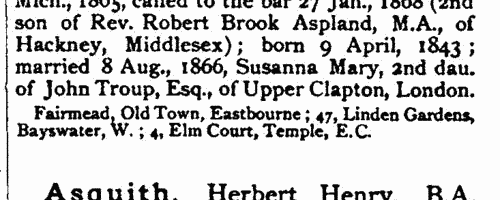
| Boys entering Cheltenham College
(1886)
Cheltenham College 'was founded in order to provide for the sons of gentlemen a Classical, Mathematical, and General Education of the highest order, on moderate terms, in strict conformity with the principles and doctrines of the Church of England.'
Andrew Alexander Hunter, the college registrar, compiled the first edition of the College Register in four parts from 1883 to 1886: these merely listed the boys by term of entry, with their dates of birth and names and addresses of their fathers. Circulars were also sent out to all Old Cheltonians whose addresses were known, requesting additional details. On the basis of the returns from these and Hunter's further researches, this much fuller register was published in 1890.
The information after each boy's name is given (where known and applicable) in this format: father's full name and address as of the time the boy entered the college; class and department on entering the college (classes being number from 1 downwards, and these again divided into A and B, some into C and D, others into P (Principal's side) and V. P. (Vice-Principal's side) - 1A was the highest class in each department: besides this, certain others were called Addiscombe, Woolwich, Civil, Direct, Line, Sandhurst, Naval, Special, Preparatory, Latin, and India Civil) and the same on leaving, name of Boarding House (or 'Day Boy'), scholastic and athletic honours attained at the college, and subsequent career (including date and place of death, or present address in 1890, if known).
Of course, in the case of these boys entering the school in the last few years before 1890 their career lay in the future, and the information gives relates only to their parentage and their time at school.HOLDSHIP. Cost: £4.00.  | Sample scan, click to enlarge
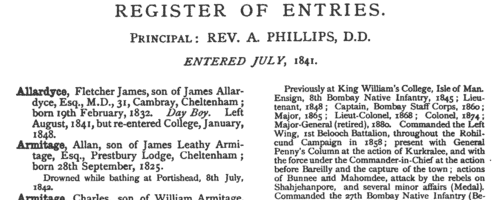
| Estates of the Deceased
(1886)
Distribution of the assets of the deceased: giving the names of the deceased and trustees &c. England and WalesHOLDSHIP. Cost: £6.00.  | Sample scan, click to enlarge

| Barristers
(1918)
The Law List for 1918 includes this 'List of Counsel, Special Pleaders, and Conveyancers at the Bar'. Each name is given in full, surname first; then the name of the Inn of Court as an abbreviation (G., Gray's Inn; I., Inner Temple; L., Lincoln's Inn; M., Middle Temple; and D. C. for Doctors' Commons) and date at which called to the bar. Barristers in practice are usually furnished with an address, and there are some abbreviated references to judicial awards and appointments. An asterisk signifies an Equity Draughtsman and Conveyancer.HOLDSHIP. Cost: £4.00.  | Sample scan, click to enlarge
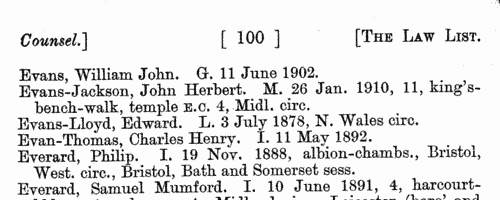
|
Research your ancestry, family history, genealogy and one-name study by direct access to original records and archives indexed by surname.
|










